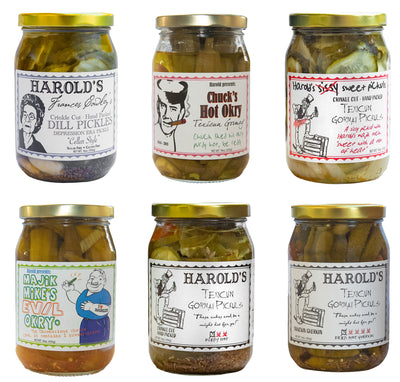What Are the Advantages of Pickles
Pickles are renowned worldwide for their tangy, crunchy, and flavorful characteristics, making them a fascinating culinary delight. These preserved vegetables or fruits, including cucumbers, carrots, cauliflower, and mangoes, boast a remarkable history that spans thousands of years.
What are Pickles?
The pickling process performs an enchanting alchemy, turning ordinary vegetables into irresistible delicacies. In the traditional fermentation method, vegetables are immersed in a saltwater brine, fostering an ideal environment for beneficial bacteria to flourish. These microorganisms work magic by converting sugars into lactic acid, lending the spicy pickle a distinctive tanginess.
One of the most interesting aspects of the ritual is its wide variety across cultures and regions. In Japan, delicate and subtly sweet "gari" pickled ginger perfectly complements sushi, cleansing the palate between each bite. On the other hand, fiery Indian "rituals" encompass a wide range of rituals. Each boasts a unique blend of spices, from tamarind pickles to mouth-watering mango pickles. South Korea's famous kimchi elevates the pickle to an art form, blending spices and fermented ingredients to create an unparalleled umami explosion.
Beyond their delectable taste, pickles offer a host of health benefits. Fermentation enriches them with probiotics, promoting a healthy gut microbiome and enhancing nutrient absorption. Additionally, pickled vegetables contain a high content of valuable vitamins and minerals, such as vitamin K, vitamin C, and iron, making them a valuable addition to a well-balanced diet.

Nutritional Value of Pickles
The nutritional content of pickles may vary based on their type and preparation method. They generally offer a diverse range of health benefits and essential nutrients. With their low-calorie count, dill pickles can be a suitable addition to calorie conscious diets. They also serve as a rich source of vital vitamins and minerals. One noteworthy nutrient in pickles is vitamin K, which plays a pivotal role in blood clotting and bone health. Additionally, pickles provide a significant amount of vitamin C, an antioxidant that bolsters the immune system and promotes skin health.
Moreover, pickles created through fermentation can contain probiotics, which are beneficial bacteria that promote gut health. These probiotics aid digestion and enhance gut flora's balance, thus contributing to overall digestive well-being.
Are Homemade Pickles Good for Health?
Homemade pickles can be a valuable addition to your diet when prepared and consumed in a balanced manner. The health benefits of homemade pickles rely on the ingredients and preparation approaches. One of the primary advantages of this type of pickles is choosing fresh, high-quality vegetables or fruits, ensuring they retain their natural nutrients. Many vegetables and fruits used in picklings, such as cucumbers, carrots, and cauliflower, are abundant sources of vitamins, minerals, and antioxidants.
However, being mindful of the salt and sugar used during pickling is crucial. Excessive salt intake can lead to higher sodium levels, potentially contributing to health issues like high blood pressure. Similarly, an excess of sugar can add unnecessary calories to the pickles. Opting for reduced-sodium or low-sugar recipes can make pickles a healthier choice.

Advantages Of Pickles
Pickles are zesty, crunchy delicacies and have their advantages and disadvantages. On the positive side, pickles can infuse meals with a burst of flavor, enhancing the overall dining experience. Their low-calorie content makes them a favorable choice for individuals mindful of their weight. In addition, fermented spicy pickles have the potential to provide probiotics that support gut health and aid in digestion. However, it's crucial to be aware that pickles can be high in sodium, potentially leading to increased blood pressure if consumed excessively.
Vital minerals in Pickles:
The sour and crunchy treats known as pickles include several necessary minerals that increase their nutritional value. The most prominent is sodium, as pickles are steeped in a salty brine solution. Sodium is essential for fluid equilibrium, neuron function, and muscle contractions. This can also be a good source of potassium, especially when made from potassium-rich vegetables like cucumbers. This mineral is necessary for heart health, neuron function, and muscle contractions. Another essential mineral, calcium, may be found in pickles prepared from vegetables such as beets or certain greens, Building strong bones and supporting numerous cellular activities.
Pickles Contain Antioxidants:
Antioxidants are substances found in pickles that prevent free radical damage to our cells. During fermentation, pickling vegetables produce antioxidants such as flavonoids, polyphenols, and vitamin C. These potent compounds collaborate to neutralize damaging free radicals and minimize oxidative stress in the body. Because oxidative stress is connected to various chronic illnesses and aging, antioxidants are vital to a healthy diet.
In addition to being loved for their zingy flavor and crunchy texture, hot pickles are also prized for the antioxidants they may contain. Antioxidants help the body fight off dangerous free radicals and protect cells from oxidative stress and damage. Pickles can have notable concentrations of antioxidants like beta-carotene, vitamin C, and other healthful phytonutrients. Especially if they are produced from colorful vegetables like red bell peppers or carrots. These powerful substances have a crucial role in boosting the immune system, encouraging healthy skin, and lowering the risk of chronic diseases, including heart disease and specific types of cancer.
Boost the Immune System:
Pickles provide taste and zest to dishes and may help improve your immune system. These delightful sweets contain critical vitamins and minerals that help maintain a healthy immune system. For example, the fermentation process in pickling improves the nutritional profile of the vegetables used, resulting in a more significant concentration of vitamins like vitamin C, which is well-known for its immune-boosting characteristics.
Pickles have been praised for their potential benefits in lowering digestive problems when consumed in moderation as part of a balanced diet. One of the primary explanations is that sweet pickles are often fermented, encouraging beneficial microorganisms' development. These probiotics support the development of healthy gut flora, which is essential for maintaining normal digestion and nutritional absorption.

Restoring Electrolyte Balance:
Pickles play a role in restoring electrolyte balance. Electrolytes, such as sodium, potassium, and chloride, are essential minerals that help maintain proper fluid balance and nerve function in our bodies. When we engage in physical activity or experience dehydration, we may lose these electrolytes through sweat. Pickles, particularly those made with salt, contain sodium and other minerals that can help replenish lost electrolytes. Including pickles in your diet, in moderation, can restore the electrolyte balance and support overall hydration, especially in situations where electrolyte loss is a concern.
Pickles Improve Liver Health:
It has been linked to possible advantages for liver health when ingested in moderation as part of a balanced diet. These veggies are fermented or pickled to create these acidic, brine-soaked treats, which bring more than simply flavor to meals. Pickles produced from cucumbers, for example, include antioxidants like vitamin C and beta-carotene that may help the body fight off dangerous free radicals and lessen oxidative stress on the liver. Additionally, the fermenting process used in pickling results in probiotics, good microorganisms that may promote gut health and tangentially improve liver function.
Pickles Promote Gut Bacteria:
Pickles play a significant role in promoting a healthy gut microbiome. Packed with natural probiotics, these tangy delights introduce beneficial bacteria to the digestive system, fostering a balanced and thriving gut environment. The fermentation process involved in pickling encourages the growth of Lactobacillus species, known for their probiotic properties. These friendly bacteria contribute to improved digestion, enhanced nutrient absorption, and strengthened immune function. By incorporating pickles into your diet, you're not only enjoying a flavorful treat but also supporting the well-being of your gut ecosystem, ultimately contributing to your overall health and vitality.
Eating Pickles Good for Pregnancy:
Pickles may be healthy to eat while pregnant for several reasons. Those are made from cucumbers and include essential minerals, including potassium, which promote healthy muscular function and help maintain fluid balance. High salt levels may aid in preventing dehydration, a major pregnant worry, particularly in warm weather. This also has a tart, pleasant taste that might aid with specific pregnancy-related desires for food. The probiotics in fermented pickles may help assist a healthy gut, aiding the mother's digestion and growing the fetus' immune system. Pickles are safe to eat during pregnancy.
Drinking Pickle Juice for Muscle Cramps:
Pickle juice has grown in favor as a treatment for muscular cramps because of its capability to ease pain and encourage relief. Muscle cramps are when muscles spasm uncontrollably and may be brought on by several things, including dehydration, electrolyte imbalances, and excessive physical effort. Pickle juice is helpful because it contains a lot of salt, which helps restore electrolytes lost via sweat or physical activity.
Conclusion
Pickles are a distinctive and savory contribution to the culinary world. They provide several health advantages in moderation, including low calories and fat while delivering vital minerals like salt, potassium, and calcium. Traditional fermented pickles may also have probiotics that promote digestive health. However, pickles may not be a good choice for those with hypertension or those following low-sodium diets because of their high salt level. Pickles may contribute to a broad spectrum of tastes and nutrients, making them a delectable and nutritious component of a well-balanced diet.


